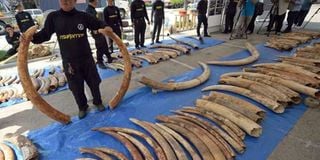Hope for elephants as ivory prices fall, say conservationists

Thai customs officers inspect confiscated elephant tusks in Bangkok on April 27, 2015. The price of ivory has fallen by nearly two-thirds in the last three years, according to research conducted in China. AFP PHOTO | PORNCHAI KITTIWONGSAKUL
What you need to know:
- In 2014, the estimated wholesale price for raw ivory stood at Sh210,000 per kilogramme on the Chinese black market, but by early this year the price had fallen to Sh73,000 per kilogramme.
- Chinese demand has driven a decade-long spike in elephant poaching in Africa, where the population has fallen by 110,000 over the last 10 years to just 415,000.
NAIROBI
The price of ivory has fallen by nearly two-thirds in the last three years, according to research conducted in China and published Wednesday by the conservation group Save the Elephants.
At its peak in 2014, the estimated wholesale price for raw ivory stood at Sh210,000 ($2,100 and 1,900 euros) per kilogramme on the Chinese black market, but by early 2017 the price had fallen to $730 per kilogramme, according to the report by two ivory trade experts, Esmond Martin and Lucy Vigne.
"This is good news, but poaching continues," said Martin.
Chinese demand has driven a decade-long spike in elephant poaching in Africa, where the population has fallen by 110,000 over the last 10 years to just 415,000, according to a recent continental survey.
Vigne said both the amount of ivory for sale as well as prices had also fallen at 130 licensed outlets in China, reflecting a drop in demand in the world's biggest ivory market.
CORRUPTION REDUCED
The researchers said China's economic slowdown, plus a crackdown on corruption which sharply reduced the giving of ivory trinkets as gifts to officials, had also crimped demand, alongside a growing awareness of the catastrophic consequences of the ivory trade for elephants.
In the past, said Save the Elephants founder Iain Douglas-Hamilton, "few Chinese associated ivory products with elephant death," but a series of campaigns had helped inform the public.
At the end of this month China's 34 remaining licensed ivory-carving factories will be closed and at the end of the year the last retail outlets will also close, following a recent government order putting an end to the legal trade.
But it remains unclear how the closing of the legal market will affect the illegal trade in elephant ivory and the poaching it drives.
International trade in ivory was banned in 1989, yet poaching continued and accelerated in recent years, feeding a black market fuelled by corruption and controlled by criminal gangs.
ILLEGAL MARKETS
The researchers said that as China's legal ivory market has contracted, illegal markets in Laos, Myanmar and Vietnam have boomed.
"The legal ivory trade will collapse in China, but in neighbouring countries there's been a boom in the illegal trade," said Martin, with "90 per cent of customers" crossing the border from China.
"The illegal ivory trade is the biggest problem," said Vigne. "A ban on its own won't help save the elephants, there has to be enforcement as well against the illegal ivory trade."
Douglas-Hamilton said it was a critical but hopeful moment for elephants.
"With the end of the legal ivory trade in China, the survival chances for elephants have distinctly improved," he said.
"The future of the African elephant is in the hands of China.
"There is still a long way to go to end the excessive killing of elephants for ivory, but there is now greater hope for the species," he added.





